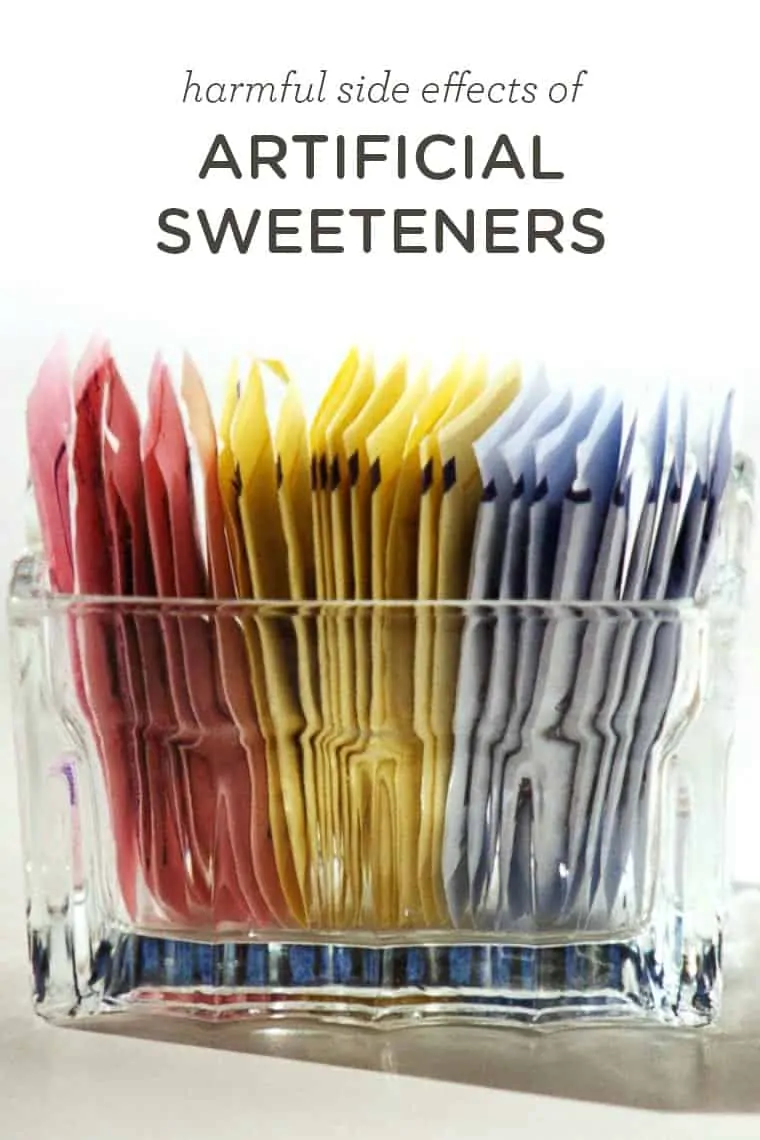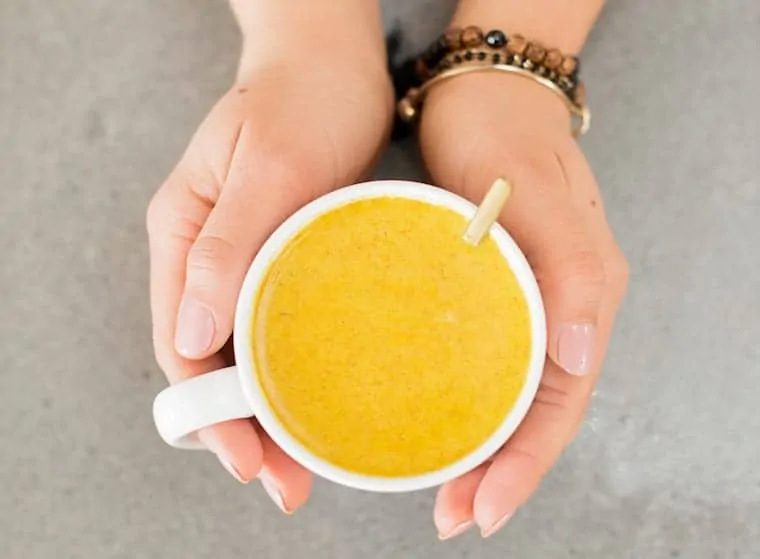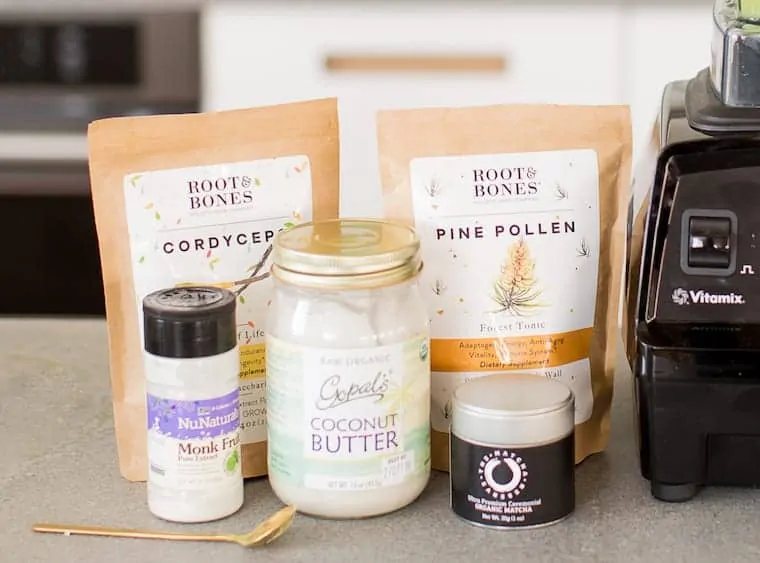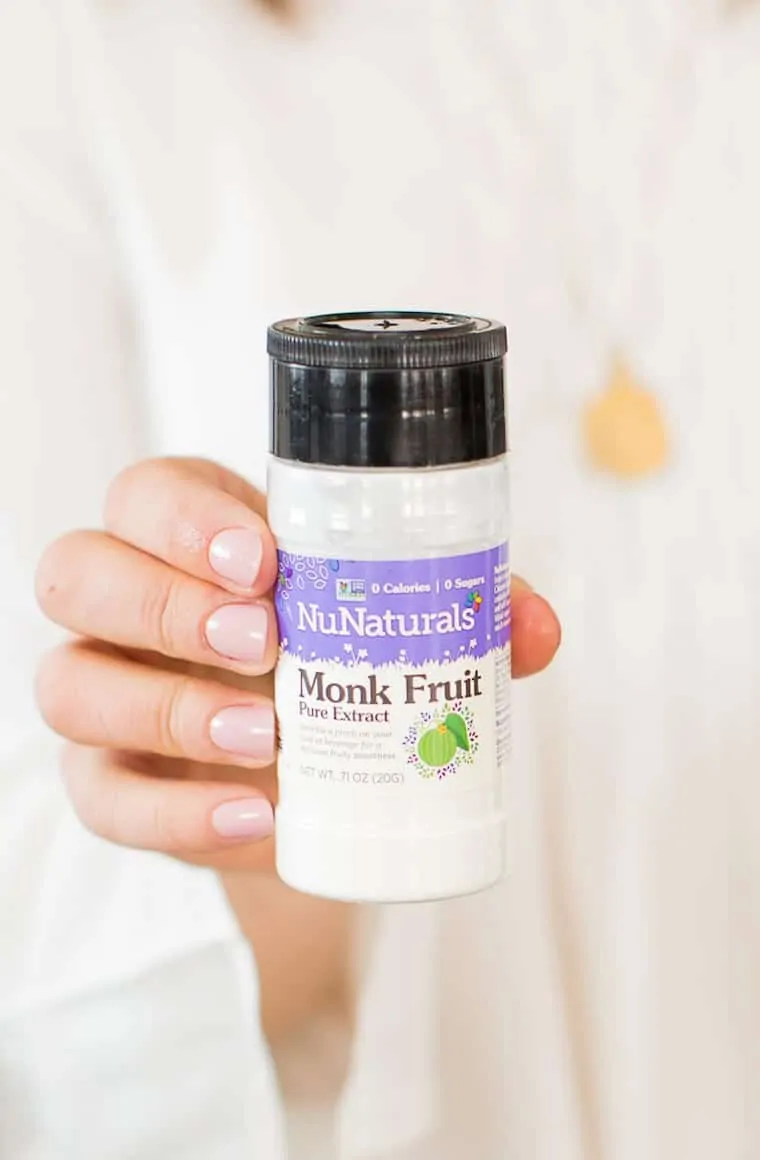A complete guide to artificial sweeteners. Are they healthy or are they harming our health? We break down each sweetener and also include healthier options.

If you’ve been an avid reader of the blog lately, you’ve probably noticed that I’m diving into all things sugar. The general theme is around the dangers of a high sugar diet and ways to limit that… and you can’t talk about that theme in full if you don’t talk about no-calorie sweeteners, amiright?!
Artificial sweeteners have a lot of draw. They add sweetness to our food of course, which makes our brain happy, but they're also zero calorie, which makes our waistline happy, right? Well…not really! It's actually be proven that artificial sweeteners can just as much harm to your health as sugar. The fake sugar packets you see in restaurants are chemicals and have been linked to health issues like weight gain, diabetes and even cancer.
So… what do we do? Let's dive in!
Are Artificial Sweeteners Healthy?
For starters, we all know that sugar needs to be eaten in moderation. Even natural sugars like honey, maple syrup, and fruit. All of those foods increase our blood sugar levels, and when eaten in excess, can lead to weight gain and other health problems. I'm not saying you stop eating those things completely, I'm just saying that you want to be mindful of how much and how often. If you want to learn more about how sugar affects the body, check out my article on the glycemic index.
The key message I want you to take away from all of this information on sweeteners is that while they're not necessarily new to the marketplace, there haven't been a ton of studies don't about their long-term effects on our health. I'll include what I've learned below, as well as outline my conclusions at the end, but I also encourage you to do your own research. This is all my own personal opinion, and my main goal is to give you helpful information so that you can make more informed decisions.
Harmful Effects of Artificial Sweeteners
First and foremost, the word “artificial” alone should put you off. Especially based on the philosophy we have here on SQ which is all about nourishing our body with whole, real foods (i.e. foods that come from good old mother earth). So when anything is coined with a term like “artificial” that immediately makes me start to question how it affects our health.
As I mentioned, there hasn't been a ton of studies done yet about the harmful effects of artificial sweeteners, but from what has been studied, there are a few areas to focus on:
- Metabolism: some scientific literature has shown the foods and beverages containing artificial sweeteners can disrupt the way our body regulates energy and glucose levels. A disruption like this may lead to a slowdown in the metabolic rate, which in turn would make it more difficult to lose weight.
- Weight Gain: while the primary purpose of artificial sweeteners is to reduce caloric intake (because they're zero-calorie), studies have shown that the regular use of artificial sweeteners has a similar impact on the pleasure center of the brain as sugar does. That, in turn, is increasing our sugar cravings, which can lead to overeating.
- Gut Bacteria: we all know how important gut health is and some studies have shown that artificial sweeteners wreak havoc on the bacteria that live in our gut. In fact, one study found that artificial sweeteners are actually toxic to digestive gut microbes.
- Cancer: there has yet to be a human study done that links artificial sweeteners to an increase in some cancers, but there have been studies done that have proven that in rodents. No governing bodies or research institutions have formally made the connection, but to me, that's something I'd avoid.
Okay so yes, they sound terrible. I'm not here to scare you, but I do want you to be aware that these sweeteners are hiding everywhere. They also live on the counters of most coffee shops around the world.
With that being said, let's walk through the most common artificial sweeteners you may see:
Sweet n Lo
The “official” name for this sweetener is saccharin. Saccharin is a chemical that the human body can’t break down, so it essentially just passes through our system. It’s about 300-400 times sweeter than sugar so you need a tiny amount to sweeten. There is not a lot of research on the harmful side effects of saccharin but some studies have shown that it disrupts gut bacteria and could increase the risk of some diseases.
Splenda
Also known as sucralose, Splenda is 400–700 times sweeter than sugar. Similar to saccharin, there are studies that have shown that sucralose disrupts the healthy gut bacteria but more studies are needed to know the long-term effects of this sweetener.
Equal
Aspartame is the formal name for Equal. This is probably the most popular artificial sweetener on the market. If you’ve ever had a diet soda, gum or countless other products that say “sugar-free” on the label, there’s a good chance you’ve had aspartame. It is approximately 200 times sweeter than sugar so just like other artificial sweeteners, you need a small amount for things to taste sweet. There is a laundry list of side effects that have been reported after ingesting aspartame, however, more studies need to be done for this to be conclusive evidence.
Xylitol
No, you won’t typically see xylitol just sitting around at restaurants but I did want to mention it! It is a sugar alcohol that is found in a lot of sugar-free products like mints and gum. It's also something that a lot of low-carb bakers use as you can find it in granulated form. Xylitol has been shown to cause gas and diarrhea and if you’re consuming larger amounts over a long period of time (over three years), it has also been linked to causing tumors. Yeah, no thanks. I'll stick with the real deal!
The Best Natural No-Calorie Sweeteners
If you're trying to avoid sugar completely, it can be challenging. Luckily there are some plant-derived options for you to choose from. One thing to keep in mind, the 100% pure forms of these sweeteners can't be used as a 1:1 substitute for sugar. They're incredibly sweet and a little goes a long way.
Stevia
Stevia doesn’t have a chemical name because it’s a plant! It is definitely the most popular in terms of plant sweeteners, but most of the options on the market today aren't actually pure stevia. They might sound healthy, but most often they're stevia mixed with a bunch of additives or even some of these other artificial sweeteners. Look for a stevia product that has just ONE ingredient: stevia. You also want it to be non-GMO (always) and organic if possible!
Monk Fruit
Monk fruit is a fruit that grows in parts of Asia, but what I’m talking about here is actually the extract taken from the fruit. This is a newer no-calorie sweetener in the wellness scene and has a really unique flavor. Some people don't like it, but it's my personal favorite. However, I've also found that it's hard to find pure monk fruit. Pure monk fruit extract is also called Lo Han Sweetener and is similar to stevia in that a little goes a long way. There's only one brand that I've found that makes a pure extract (click here to get it)– the others are often mixed with fake sugars as we mentioned above.
The Bottom Line on No-Calorie Sweeteners
The bottom line? It's very important that if you do use a non-calorie sweetener you are using one that is made from 100% pure, natural, organic and non-GMO ingredients. I would 100% skip chemical sweeteners like Sweet n Lo, Splenda or Equal. The impacts on gut health, dependence, among other things, from these sweeteners is just not worth it to me. Opt for raw cane sugar instead if you're presented with those at the coffee shop. It's healthier for you in the longer term.
For me, my no-calorie sweetener of choice is monk fruit extract. I find it to be just the right amount of sweetness – I use it sparingly in my matcha and other lattes – and have found no adverse effects of eating it. Stevia is another option, but most stevia powder on the market today has additives, preservatives and is genetically modified.
Rember: always look for 100% pure monk fruit or stevia with NO additives. And like I said earlier, these natural sweeteners also should be enjoyed in moderation. Don't use them to sweeten every single thing you eat. Don't add loads and load of them to your coffee or tea. Just a sprinkle here and there when needed.
Do you use no-calorie sweeteners? Which one do you typically reach for?
Resources
- https://draxe.com/monk-fruit/
- https://www.sciencedaily.com/releases/2018/04/180423085440.htm
- https://www.sciencedaily.com/releases/2018/10/181001101932.htm
- https://www.cnbc.com/2018/10/03/artificial-sweeteners-are-toxic-to-digestive-gut-bacteria-study.html




